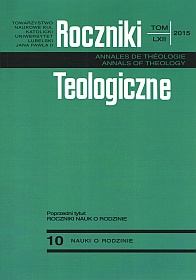Protagoras and Gorgias in Contemporary Mass Media
Abstract
Until not so long Sophists' methods were very popular among young people, particularly the ones regarding moral life. Protagoras did not directly advocate for objective truth, for the good or evil, for justice and injustice. He only taught methods for winning disputes with the argument one was concerned about. The content of the statement itself was of no importance; argument's victory was the ultimate goal. Even the weaskest, unlikelely or simply untrue argument in the discussion can win given that the proper technique and skills in use of words are applied. Along human civilization development, this word-use technique and verbal dexterity have assumed different forms. First and foremost they have served the purpose of relativism in human thinking and acting. Man was gripped with nihilism to a lesser extent; Gorgias was a representative of nihilism. Negation of any truth, radical separation of thoughts, words and being has been present in every era and has had its small-scale representation. The Sophists' views have weakened and still weaken the importance of truth in human life. And only the truth, as the contemporary philosopher Karol Wojtyła says constitutes humanity and every human being's dignity.
References
Bandini L.: Pensatori greci, Firenze 1950.
Benedykt XVI: Encyklika „Caritas in veritate”, Rzym 2009.
Biesaga T.: Sytuacjonizm etyczny, w: Powszechna Encyklopedia Filozoficzna, t. I, Lublin: Polskie Towarzystwo Tomasza z Akwinu 2008, s. 293-296.
Day L. A.: Ethics in Media Communications, Belmont: Thomson Wasworth 2006.
Galarowicz J.: Imię własne człowieka. Klucz do myśli i nauczania Karola Wojtyły – Jana Pawła II, Kraków: Wydawnictwo Naukowe Papieskiej Akademii Teologicznej 1996.
Griffin E.: Podstawy komunikacji społecznej, Gdańsk: Gdańskie Wydawnictwo Psychologiczne 2002.
Iłowiecki M.: Krzywe zwierciadło. O manipulacji w mediach, Lublin: Gaudium 2003.
Jan Paweł II: Orędzie na XXXIV Światowy Dzień Środków Społecznego Przekazu pt. „Głosić Chrystusa w środkach społecznego przekazu na progu nowego tysiąclecia”, Watykan 2000.
Jęczeń J.: I Communicate, Therefore I AM, Lublin: Wydawnictwo KUL 2014.
Jęczeń J.: Człowiek i rodzina w przestrzeni medialnej, Sandomierz: Wydawnictwo Diecezjalne i Drukarnia w Sandomierzu 2011.
McKay M., Davis M., Fanning P.: Sztuka skutecznego porozumiewania się. Praca. Rodzina. Zabawa, Gdańsk: Gdańskie Wydawnictwo Psychologiczne 2010.
McLuhan M.: Understanding Me. Lectures and Interviews, Toronto: Anansi 2003.
McLuhan M., Zingore F. (red.): Essential McLuhan, Toronto 1995.
Reale G.: Historia filozofii starożytnej, t. I: Od początków do Sokratesa, tłum. E.I.Zieliński, Lublin: RW KUL 2000.
Robin L.: Storia del pensiero greco, Torino 1951.
Stearn G. (red.): McLuhan: Hot & Cool, New York 1967.
Tatarkiewicz W.: Historia filozofii, Warszawa: Wydawnictwo Naukowe PWN 2011.
Tokarz M.: Argumentacja. Perswazja. Manipulacja. Wykłady z teorii komunikacji, Gdańsk: Gdańskie Wydawnictwo Psychologiczne 2006.
Wojtyła K.: Osoba i czyn oraz inne studia antropologiczne, Lublin: TN KUL 1994.
Wojtyła K.: Segno di contraddizione. Esercizi nel Vaticano, Roma-Vaticano, Sede Apostolica 5-12 III 1976, Milano 1977.
Wojtyła K.: Znak sprzeciwu, Paryż 1980.
Copyright (c) 2015 Roczniki Teologiczne

This work is licensed under a Creative Commons Attribution-NonCommercial-NoDerivatives 4.0 International License.





